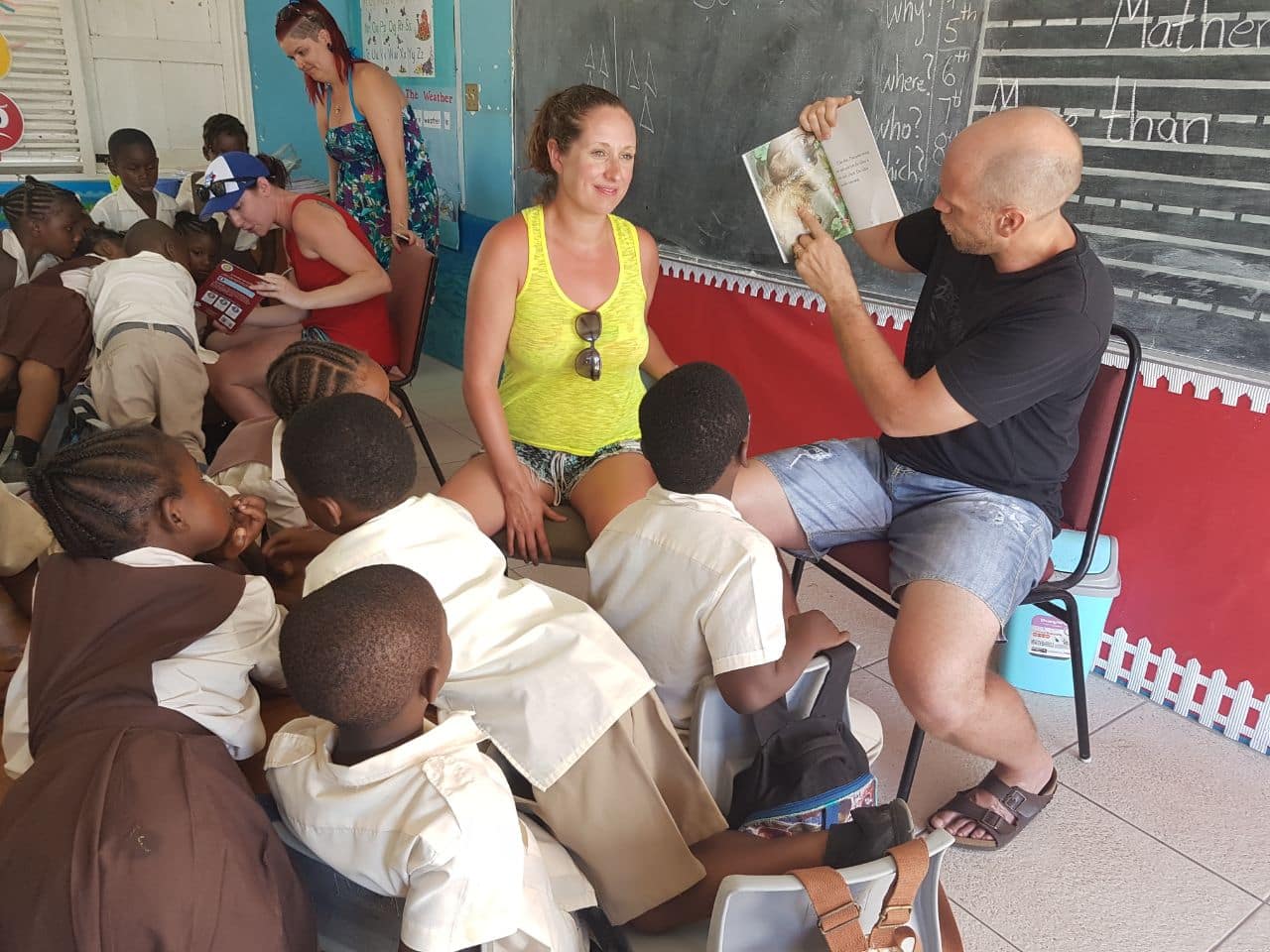
To promote high achievement in literacy, the United States, through the U.S. Agency for International Development (USAID), partnered with the Organization of Eastern and Caribbean States (OECS) since 2015 through the Early Learners Program (ELP) to improve reading achievements of learners in Grades K through 3 in Antigua and Barbuda, Dominica, Grenada, St. Kitts and Nevis, Saint Lucia, and St. Vincent and the Grenadines.
On International Literacy Day, September 8, the U.S. and the OECS co-hosted a webinar entitled “The Future of Reading in the OECS.” As the culminating event of the ELP, valued at $8.6 million USD, webinar panelists described the impact of the ELP on early grade readers’ performance, shared best practices throughout the OECS and highlighted how OECS Member States are planning for sustainability of the various tenets and initiatives of the ELP.
Webinar participants included students, caregivers, teachers, ELP representatives, OECS representatives, USAID Regional Representative, St. Vincent and the Grenadines Minister of Education, the Director General for the OECS Commission and the U.S. Ambassador to the OECS and Eastern Caribbean, among others. The webinar reached audiences throughout the Eastern Caribbean.
“Supporting reading and educational advancement is in keeping with the United States’ ongoing commitment to increase the security, prosperity, and well-being of the people of the Caribbean through the U.S.-Caribbean 2020 Strategy,” stated U.S. Ambassador Linda Taglialatela as she opened the webinar.
The ELP has contributed to a 50% increase in reading performance among 2nd graders across the region since 2015. The ELP has reached over 73,000 primary level learners, provided professional development to over 3,400 teachers, and enabled over 1,400 lessons and 1,000 coaching sessions with teachers. Further, the ELP provided development grants for reading enhancement projects to 60 schools and 304,552 teaching and learning materials to 2,582 classrooms across the OECS.
USAID Regional Representative Clinton White described one of the sub-initiatives of the ELP: “Given the importance of culturally relevant reading material, the ELP is in the process of publishing 41 stories authored by local teachers, community members, and students as young as seven for distribution to classrooms within the OECS Member States.”
The Director General for the OECS Commission, Dr. Didacus Jules stated, “The OECS Commission would like to thank the government and people of the United States for supporting the region and tackling this global literacy effort through the funding of the ELP and its predecessor, the Centers of Excellence for Teacher Training Program. I would also like to acknowledge the Ministries of Education for their commitment and contribution in implementing the ELP.”
The webinar featured the ELP’s collaboration with Member States. Panelists described what stakeholders and Ministries in each Member State are doing to support key initiatives to ensure that the reading gains achieved are continued and improved upon.
St. Vincent and the Grenadines Minister of Education St. Clair Prince, highlighted some of the enduring impacts of the ELP as curriculum guidelines, instruction best practices, home language incorporation into the curriculum, reading assessment instruments, ELP coordinators’ engagement, and locally produced literature for early readers.
Minister St. Clair Prince stated: “Our expectation is that the full impact of the ELP will begin to reveal itself more fully in the next three to five years. By then the situation regarding reading should be greatly improved here in St. Vincent and the Grenadines.”
U.S. Ambassador Taglialatela closed her remarks by thanking the Member States, the OECS, ELP coordinators, teachers and caregivers for their work at ensuring the continued success of this program. “I am confident that over the next few years, through your investments to sustain the program, you will see improved reading performance and a flourishing culture of reading. Together, we can ensure that every child reads, learns and grows and that the quality of life of every citizen in the region improves.”
Advertise with the mоѕt vіѕіtеd nеwѕ ѕіtе іn Antigua!
We offer fully customizable and flexible digital marketing packages.
Contact us at [email protected]

















With all due respect the woman in the yellow is not dressed appropriately to be in a primary school class room.
Agreed 100% . They think they can do as they wish but in all the good that she’s aspiring to do , she should have dressed more appropriately. It’s actually disrespectful
It’s a good program.
Seems this is a photo of tourists reading to primary children.
Previous observations are correct and the ‘teachable moment’ is to ask any hotels that encourage guests to participate in local initiatives to properly brief the tourists on our customs & expected dress codes.
I believe most tourists would comply if they understood the reasons why & that they are entering a place of learning/work, not a tourist activity.
@Stay Alert…did you really say, that, adults enlisted in a program to go into a Primary School, should be given advice, on “dress code?”
Are you serious, any adult that has to be told how to dress appropriately, in such a situation does not need to be, a part of any such program, which includes kids and children.
This individual would NOT dare, would not even contemplate for a moment, about wearing, “pom-pom, Daisy Duke” shorts, to any such program in any, elementary school in America. They would not even get to enter, the compound!
And, I will add! If, this was a BLACK(and yes, I am using CLASSISM here); if, this was a BLACK Tourist, would your response be the same?
Comments are closed.